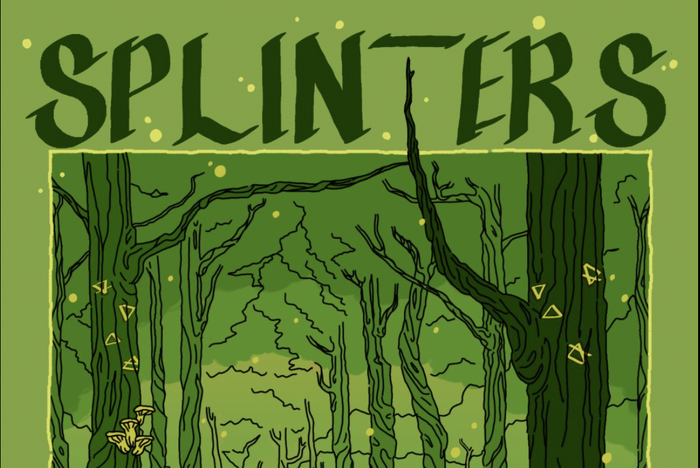Unsoiled breaks new ground
Charlie Butler reviews the “entirely new” student-written drama taking the Corpus stage

Unsoiled is a new student-written drama currently playing at the Corpus Playroom. It follows the inhabitants of a village who have ploughed the same soil for generations, yet who suddenly find themselves unable to shift so much as a crumb of it, the land having hardened impossibly beneath their feet. Unable to grow food, the threat of famine looms and chaos rears its ugly head.
“The comedic and the tragic find a home together in the fantastic supporting characters”
One of the most interesting things about this play is the way in which the comedic is combined with the tragic. Although this tension creates an exciting air of unpredictability (will this end like a comedy, with a big harvest and everyone getting married?), it takes a while for these two opposing styles to reconcile. The juxtaposition between the first scene, which features understated performances from Maya Calcraft and Rebecca Davis as the youthful yet troubled Nina and Orla, and the next, in which Nina’s pantomime-ish parents (Martin Carter and Katy Lawrence) chase her brother around the room with a basket is at best confusing, and at worst, confused.
However, the comedic and the tragic settle down and find a home together in some of the fantastic supporting characters. Chief among these are the Man for Catastrophe (Isobel Lawrence), whose bumbling nature is wholly unsuited to the task of leading the village out of what he insists is merely a “crisis” and Whilom (Oscar Matthews), a man in proud possession of a single pot of soil. Characters such as these are so effective because they are both very funny and soberingly recognisable. Perhaps three years ago the characters of an incompetent politician and a greedy opportunist attempting to profit from a crisis would just have been funny.
Although it was the comic supporting cast who impressed me the most, the acting was solid all around. I do wish, however, that some of the actors had projected their voices a little more. The dynamics between the four main characters: Orla, Nina, Pete (Jake Fenton) and Brangwen (Jake Turner) were presented well, although I did start to find Pete’s exaggerated naïveté a little irritating after a while. Additionally, I would have liked to have seen more scenes featuring just Orla and Nina, as their relationship – which should have been the heart of the play – was left largely unexplored, although the few scenes which they do have together are delightful.

It has to be addressed that the cast of this play was by far the least racially diverse of any I have seen in Cambridge. I do not wish to overshadow the many strengths of the production and the performances given by the actors by pointing this out. However, for a play with a reasonably large cast such as this one, to be so dominated by white actors – particularly at a time when the CUADC itself has just published guidance encouraging producers to prioritise “marginalised” auditionees – is disappointing, to say the least.
I will now attempt an incredibly jarring change of tone as I switch gears completely and start talking about set design.
“This looseness of setting prevented the play from getting bogged down by historical detail”
Thankfully, this production was altogether devoid of any clunky scene-changes, thanks to the extremely minimalist set which consisted solely of a painted backdrop. The abstract, organic patterns fitted the mystical atmosphere of the play as well as its predominantly outdoor settings. In the absence of a set, a sense of place and changes in setting were suggested mostly through the use of lighting. The choice to make use of a white backdrop really came into its own here, allowing the lighting designer (Tungsten Tang) to project different colours and effects onto the walls and create a brilliant sense of atmosphere.
Costumes were eclectic yet effective, each suiting the character well while leaving the exact time period and location unspecified. This looseness of setting prevented the play from getting bogged down by historical detail and allowed the writer (Ewan Martin-Kane) to get creative inventing the dialect, customs and system of government of Briggsley village.
The lack of any sound effects or pre-recorded incidental music gave the production a certain eeriness and low-tech appeal. The soundtrack was instead provided by The Bard (Anna-Maria Woodrow) who serenaded the audience as we entered and returned throughout the show as a singing narrator of sorts. These musical interludes combined wonderfully with the poetic and lilting dialogue in order to solidify the play’s uniquely lyrical style.
All in all, the real triumph of this show was the highly distinctive and utterly engrossing atmosphere which it presented through a combination of acting, dialogue, music and design. The most exciting thing about going to see student-written plays is that they provide the rare opportunity to witness something entirely new, and tonight I left the theatre with the feeling that I had done just that.
Unsoiled is playing at the Corpus Playroom until Saturday the 5th of March.
 News / Candidates clash over Chancellorship25 April 2025
News / Candidates clash over Chancellorship25 April 2025 Interviews / Dr Ally Louks on going viral for all the wrong reasons25 April 2025
Interviews / Dr Ally Louks on going viral for all the wrong reasons25 April 2025 News / Cambridge professor paid over $1 million for FBI intel since 199125 April 2025
News / Cambridge professor paid over $1 million for FBI intel since 199125 April 2025 Music / The pipes are calling: the life of a Cambridge Organ Scholar25 April 2025
Music / The pipes are calling: the life of a Cambridge Organ Scholar25 April 2025 Comment / Cambridge students are too opinionated 21 April 2025
Comment / Cambridge students are too opinionated 21 April 2025






